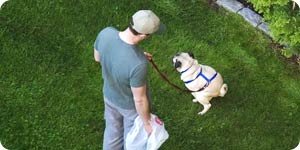
One of the least desirable aspects of owning a dog is the cleanup of dog poop. It is an unfortunate side effect of owning a dog, but with the proper tools, clean up is a breeze.
The first thing a dog owner should understand is why the cleanup is important. If you are cleaning up an accident indoors with the intention of completely removing all trace of the accident, you will not only need to clean up the mess, but the odor as well. Dogs are creatures of habit. As you watch your dog, notice that he will generally try to use the same spots over and over again to relieve himself. This same idea holds true whether the dog is indoors or out. When attempting to housebreak your dog, you will need to remove all traces of the accident to keep this instinct from kicking in. For hard, non-porous surfaces like linoleum or tile, clean the mess by removing the solid matter and then cleaning the area thoroughly with bleach. Not only will this technique remove the odor, most dogs do not like the smell and will not return to the same spot. On porous surfaces like carpet, hardwood floors and the like, once again, clear the area of any solid debris and then soak the area with a commercially prepared enzyme solution specially prepared to remove pet odors. These enzymes will go to work immediately; breaking down the organic compounds that make up the chemical markers that dogs can smell long after the accident has been removed.
When removing dog waste outdoors, the reason is more than just esthetic. Dog waste should be regularly removed from areas where humans frequent because parasites and other contaminates can be transmitted to humans who come in contact with the feces. Most pet stores carry a three-foot long spring-loaded claw that will completely remove the dog poop from grass, concrete, and asphalt with ease. After removal of the poop, an enzyme solution made for outdoor use should be used as directed to dissolve any remaining organic matter and kill parasites, without causing damage to the lawn or contaminate the soil.
No matter where a dog decides to relieve himself, it is always best practice to completely remove the waste at least once a week to ensure proper hygiene and stop the spread of parasites between dogs and people. Indoor waster removal should occur as soon as the accident is detected.
